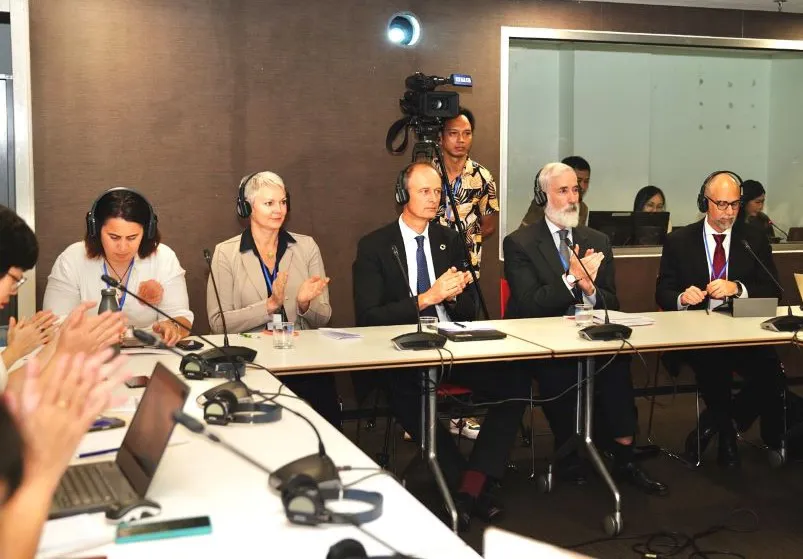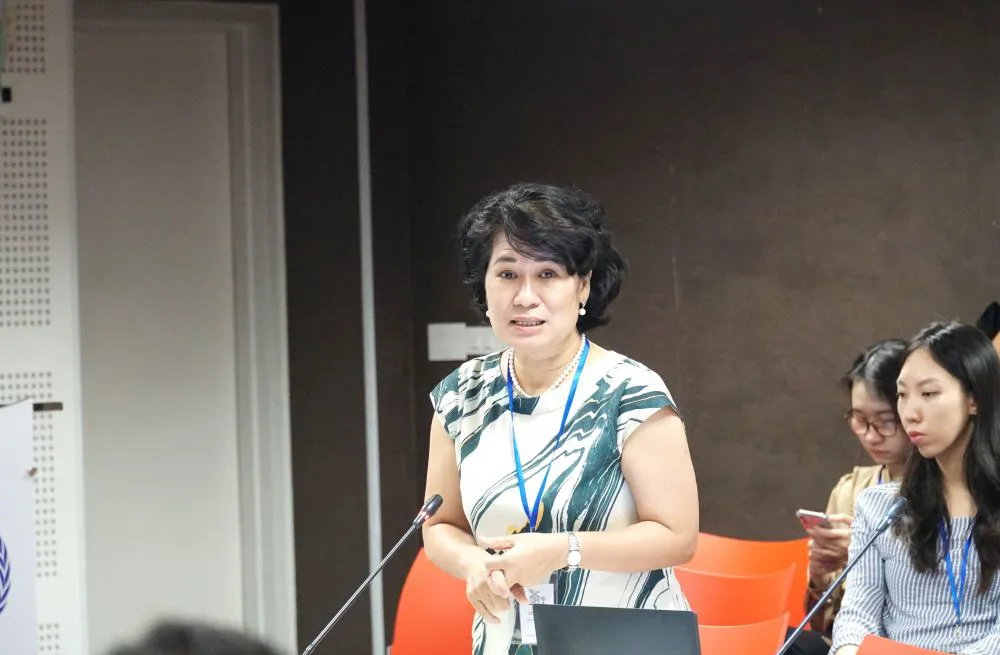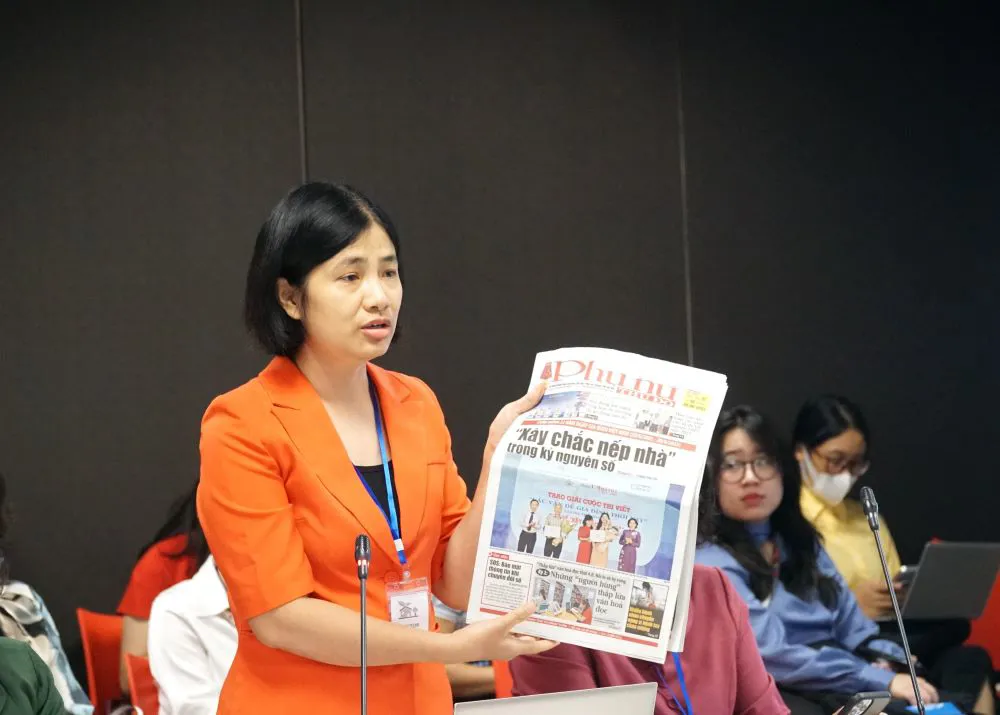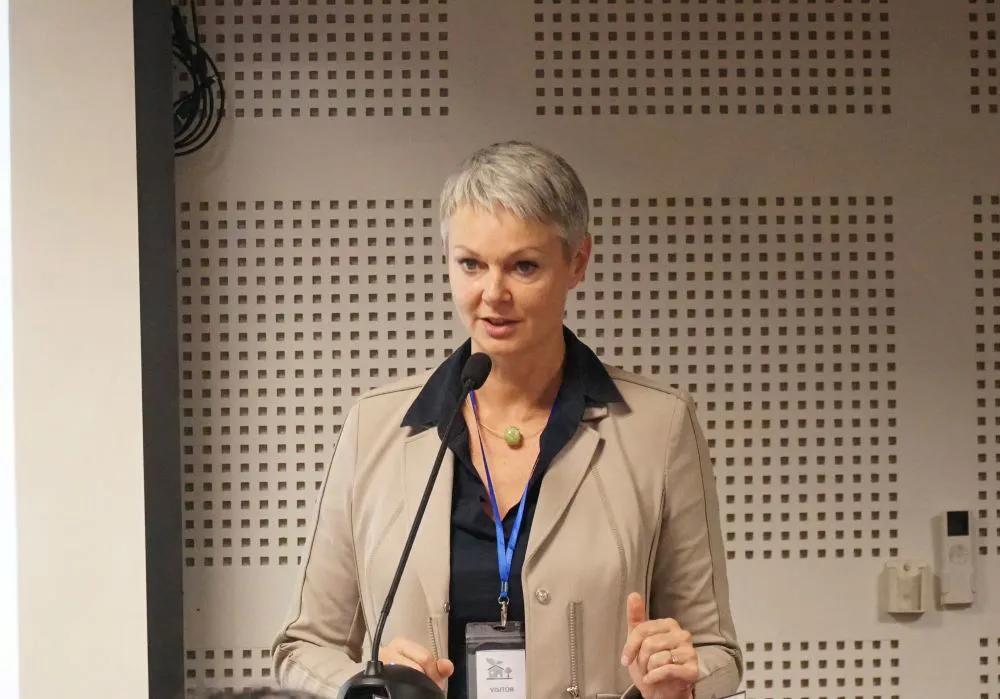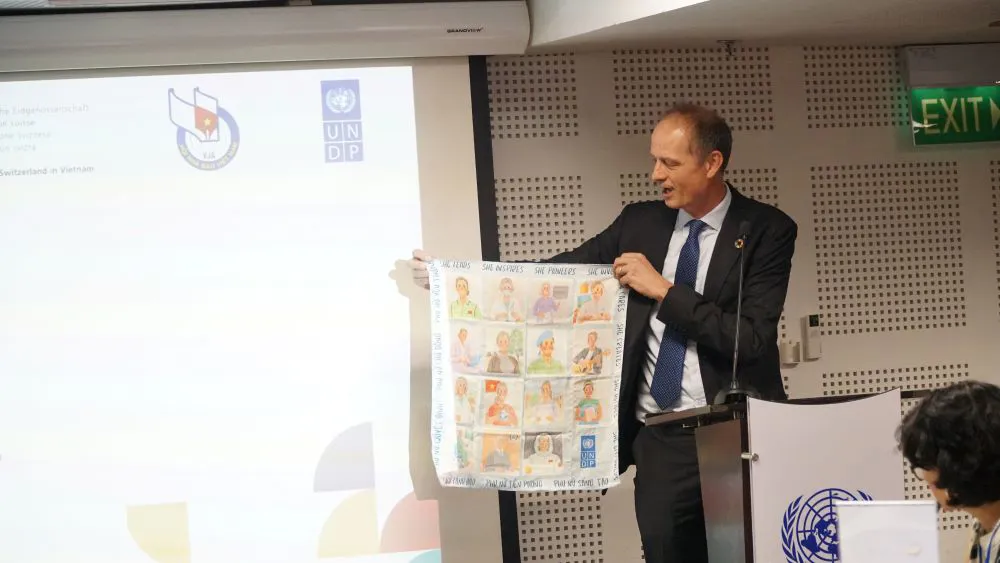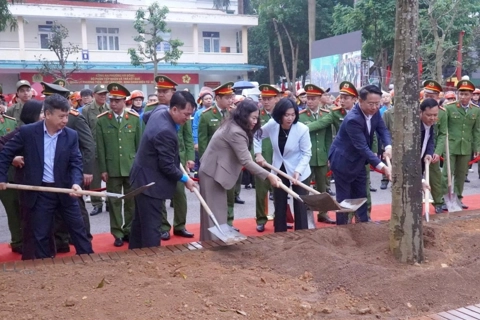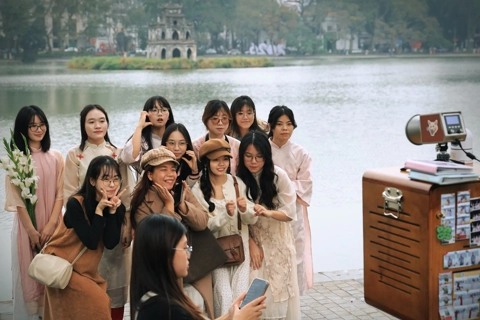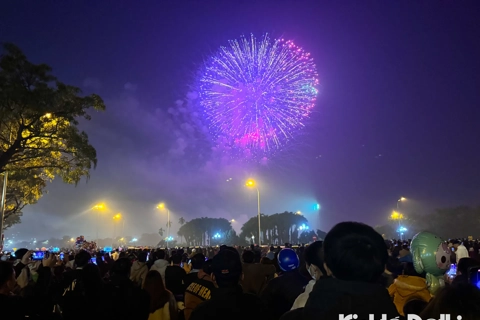Prejudices: Challenges to gender equality in Vietnam
Gender stereotypes have generated preconceptions when it comes to reporting on gender-related issues in Vietnam and changes should be made to improve the situation.
Prejudices become the biggest challenge to gender equality in Vietnam, it was learned at a seminar on gender and the press held by the United Nations Development Program (UNDP) and the Embassies of Canada, New Zealand, Norway, and Switzerland in Hanoi (G4).
| From left: Ambassador of New Zealand to Vietnam Tredene Dobson, Norwegian Ambassador to Vietnam Hilde Solbakken, Deputy Resident Representative UNDP in Vietnam Patrick Haverman, Deputy Chief of Mission of Switzerland in Vietnam Aldo De Luca, and Canadian Ambassador to Vietnam Shawn Steil. Photos: UNDP Vietnam |
Ambassadors, domestic and international experts shared useful experiences and recommendations at the “Gender and News” talk, held on October 18 at the Green One UN House in Hanoi in celebration of Vietnamese Women’s Day (October 20).
Gender stereotypes also affect the gender reporting of certain journalists, according to Nguyen Thu Ha, Deputy Director of the Center for Digital Content Production and Development, Vietnam Television (VTV).
Based on her observations, for instance, the women portrayed in the articles on the occasions of Vietnamese Women’s Day (October 20) and International Women’s Day (March 8) are those who are economically disadvantaged. They are usually wet market workers, not attractive or talented women. This shows the stereotype that associates women with hardship.
| Nguyen Thu Ha, Deputy Director of the Center for Digital Content Production and Development, Vietnam Television (VTV), speaks at the event. |
This is her view despite the fact that VTV and local radio and television stations pay significant attention to producing programs for women that gain so much response, namely “Happy Woman,” “When Women Master,” “Women Born to Be Loved,” among others.
Hilde Solbakken, Ambassador of Norway to Vietnam, shared the same view, saying that sometimes when a female politician appears in the media, the comments are mostly on how she looks, and what she wears but not on her ability.
Echoing Nguyen Thu Ha, Tran Hoang Lan, Head of Family News Desk of Capital Women Newspaper, pointed out the prejudices and difficulties facing her reporters, saying that a long-standing gender stereotype has formed a generalized view among agencies, organizations, and localities in working with gender-oriented newspapers.
Many of them hold the opinion that women’s newspapers exclusively cover topics such as family affairs, mother-in-law and daughter-in-law relationships, bedroom matters, and marital love but not broader issues such as advocating for gender equality, better enforcement of women and girls’ rights, and raising voices against gender inequality.
Apart from preconceptions, legal misunderstandings or psychological barriers have made it more difficult to report gender-based crimes like child and woman abuse. Numerous victims declined to cooperate or report or conceal evidence for the perpetrators —who are occasionally family members.
Moreover, reporters involved in numerous cases are threatened by abusers and perpetrators of gender-based violence.
Tran Hoang Lan, Head of the Family News Desk of Capital Women Newspaper, shares her views on the issues. |
“The gender stereotypes have limited the range of topics and activities that reporters can cover,” Lan said.
Echoing the same sentiment, Vu Huong Thuy, Vice Head of Local News Desk, the Vietnam News Agency, said there remain numerous difficulties in covering gender-related issues and gender-based violence, causing occasional and undiversified reporting.
The primary causes include the absence of close coordination among relevant agencies; reporters’ limited knowledge, skills, and experience regarding gender-based violence. In particular, funding for the implementation and production of gender-related works and programs is constrained.
Contributions at the event are aimed at creating openness for experts and journalists to discuss and find the best solutions to the issues, contributing to promoting gender equality in Vietnam.
| Hilde Solbakken, Ambassador of Norway to Vietnam, delivers a speech. |
Hilde Solbakken, Ambassador of Norway to Vietnam, said gender equality is among issues in the G4’s work with the Government of Vietnam over the past years in a spirit of respect and collaboration.
In a broader sense, gender equality is a right and is included in the United Nations’ 2030 Agenda for Sustainable Development Goals.
According to Ambassador Hilde Solbakken, the world is inundated every day with information and news from multiple sources, including social media platforms, and the power of media in shaping how people act and understand the world is unquestionable. It includes something as fundamental as how we view men and women and people with different gender identities.
There is a need to make sure how the media is using it, what it takes for journalists to carry this responsibility, and what kind of help and guidance journalists can get to navigate this sometimes.
She believed that journalists’ reporting helps to tackle societal biases, avoids reinforcing existing gender stereotypes, and contributes to educating professional and young journalists on gender-sensitive coverage.
| Patrick Haverman, Deputy Resident Representative UNDP in Vietnam, highlights the role of women. |
In a similar vein, Patrick Haverman, Deputy Resident Representative UNDP in Vietnam, highlighted the role of women in society as carers, pioneers, creators, inspirers, inventors, leaders, decision-makers, and empowerers.
He said when reporting on general issues, the media hold a unique position in shaping public perceptions and opinions. The media can empower, inspire, and drive change. But it can also influence the public in other ways with harmful stereotypes and biases. For that reason, journalists’ responsibilities are vital for an equitable society media and achieving sustainable development.
In fact, notions amplify marginalized voices and lead to judgments. Therefore, media can influence social norms and promote a society in which every individual, regardless of gender, has equal opportunities to strive.
He stressed that “it’s crucial to recognize the reporting on gender-related issues. With a set of considerations, we must be aware of the potential stereotypes or reinforced biases. The choice of words or audio-visual with a lot of vital considerations is the intersectionality of gender with aspects of identity and sexual orientation.”
Vu Huong Thuy from the Vietnam News Agency said the media must be given the quickest access to official sources of information and data on gender equality and be allowed to participate in the policymaking process to empower them on gender-related issues.
Simultaneously, organizations actively provide data and information while training editors and reporters and fostering collaboration to combat gender-based violence and promote gender equality.
Pham Thi My, Head of the Vietnam Female Journalists Club, said 50 clubs in different localities nationwide have been promoting over the past 20 years the power of female women and contributing to gender equality in the country.


